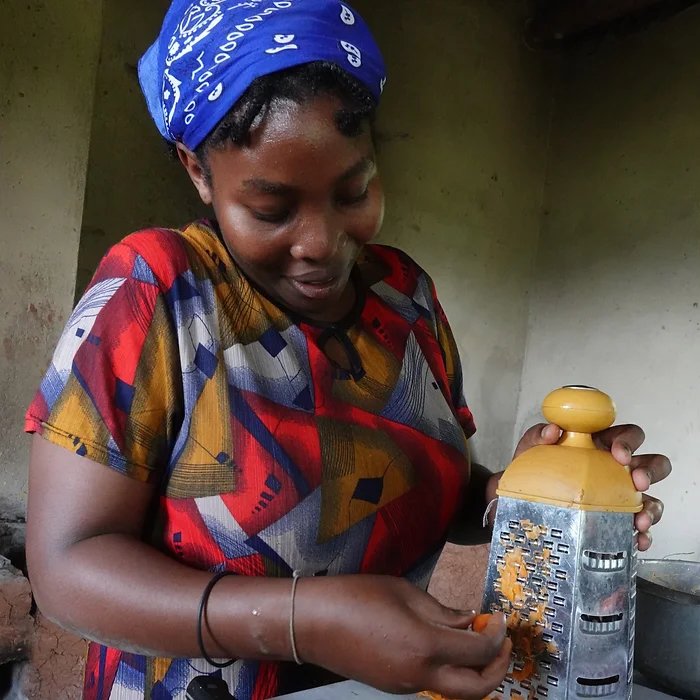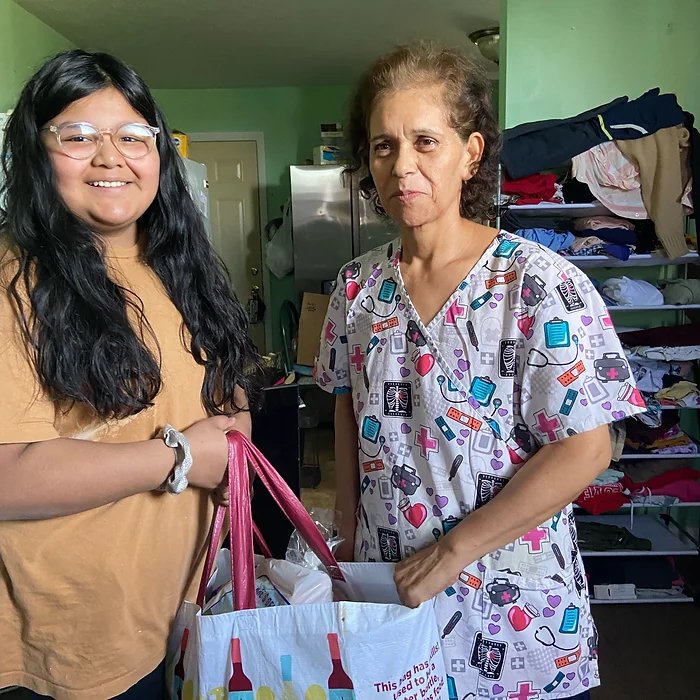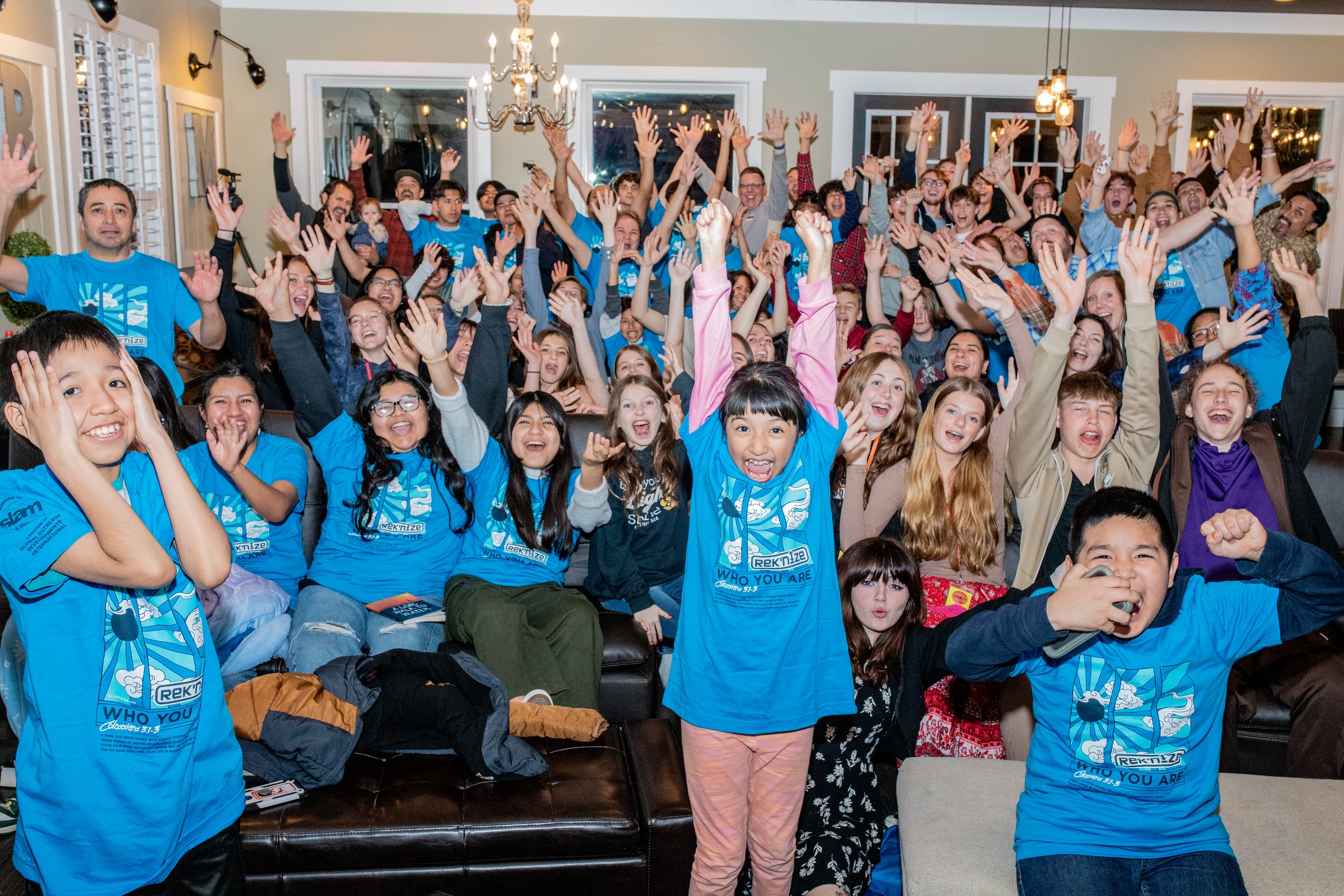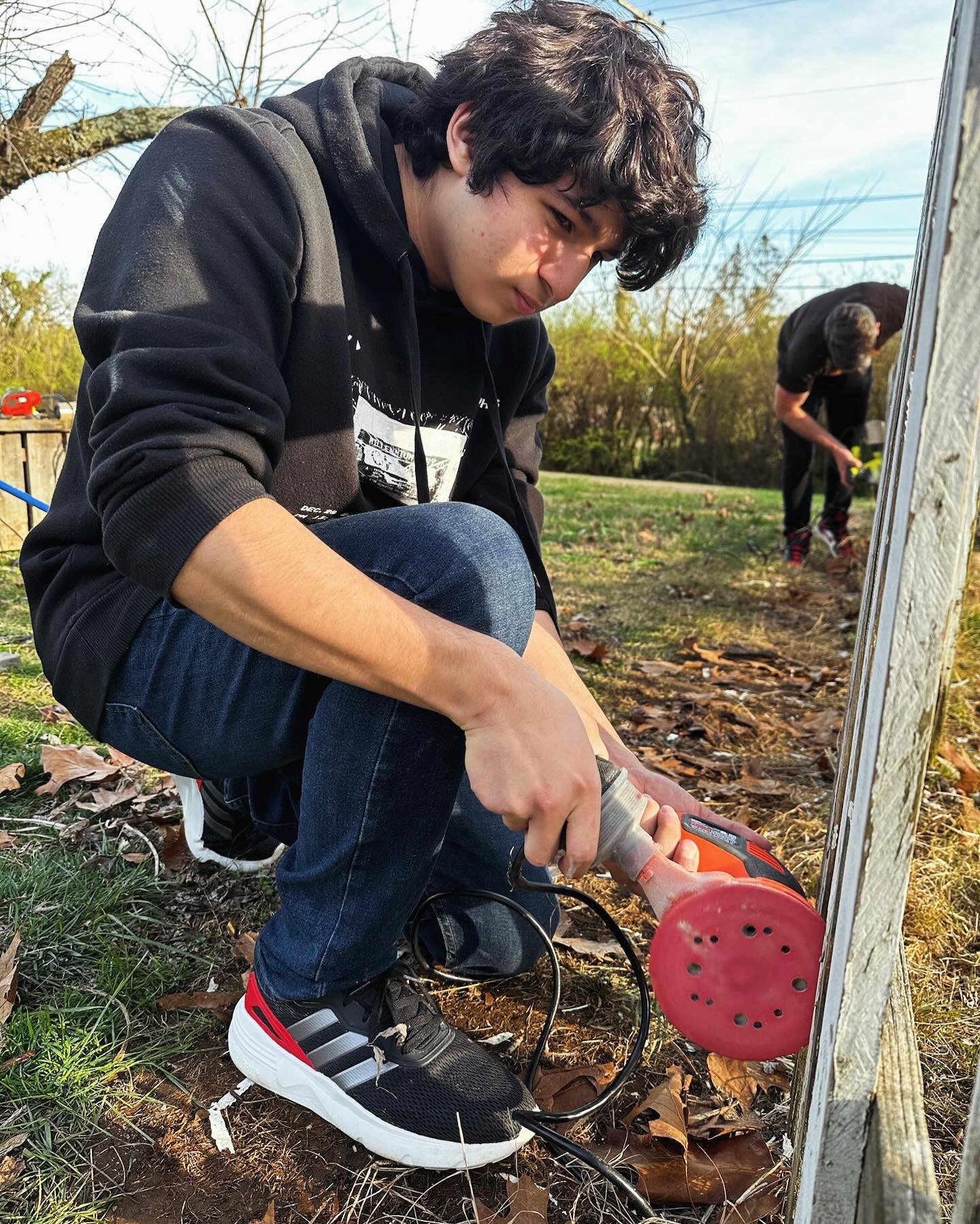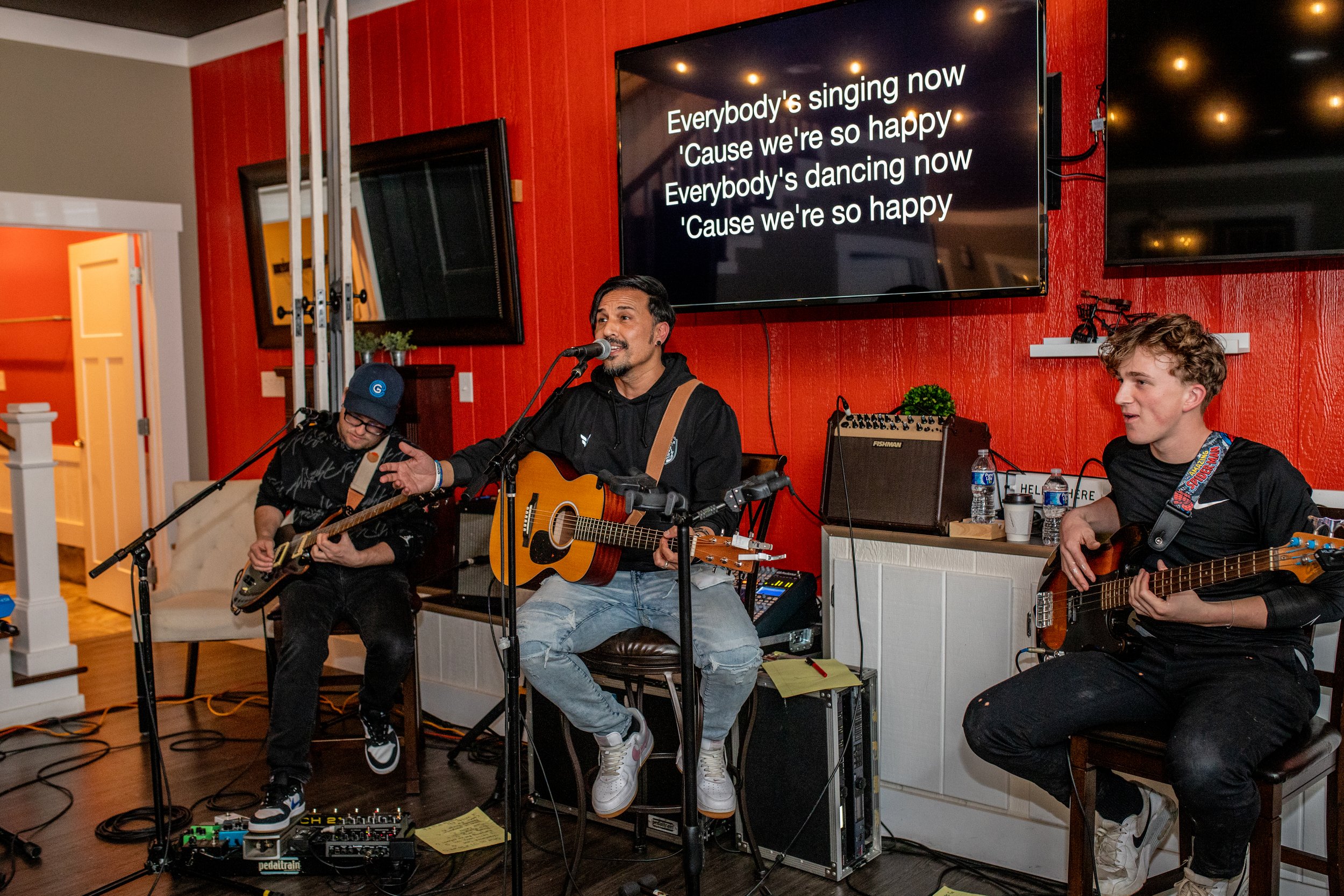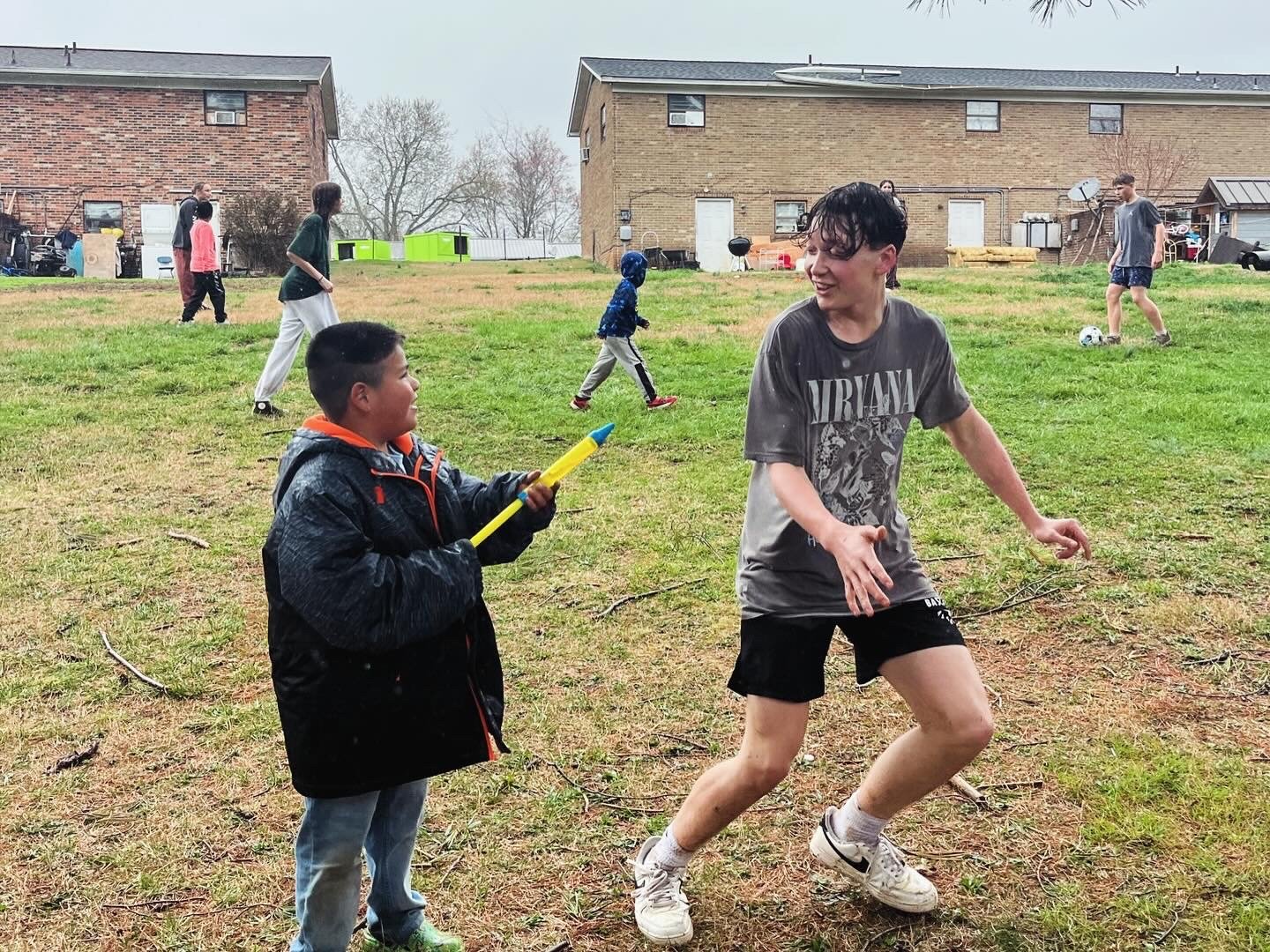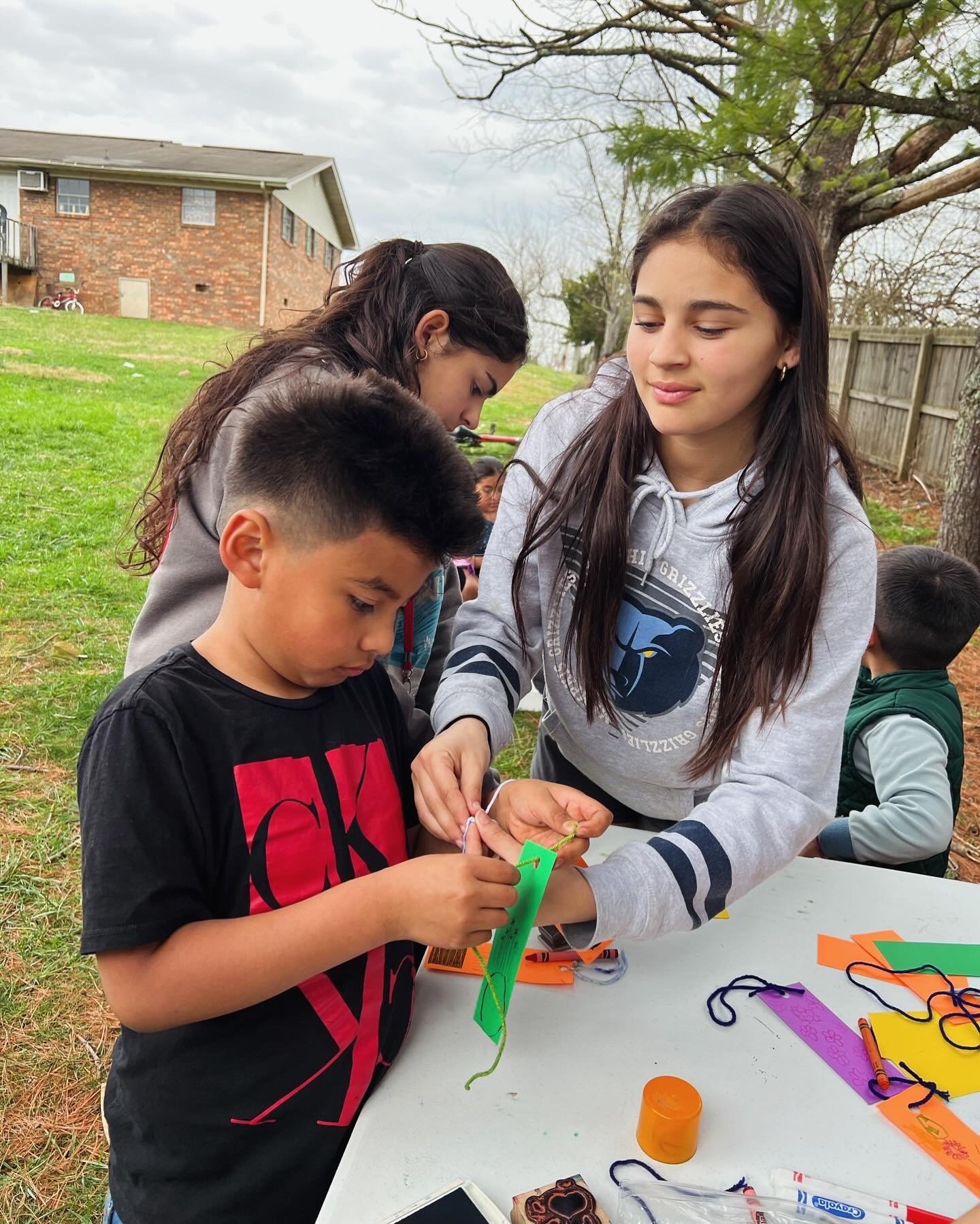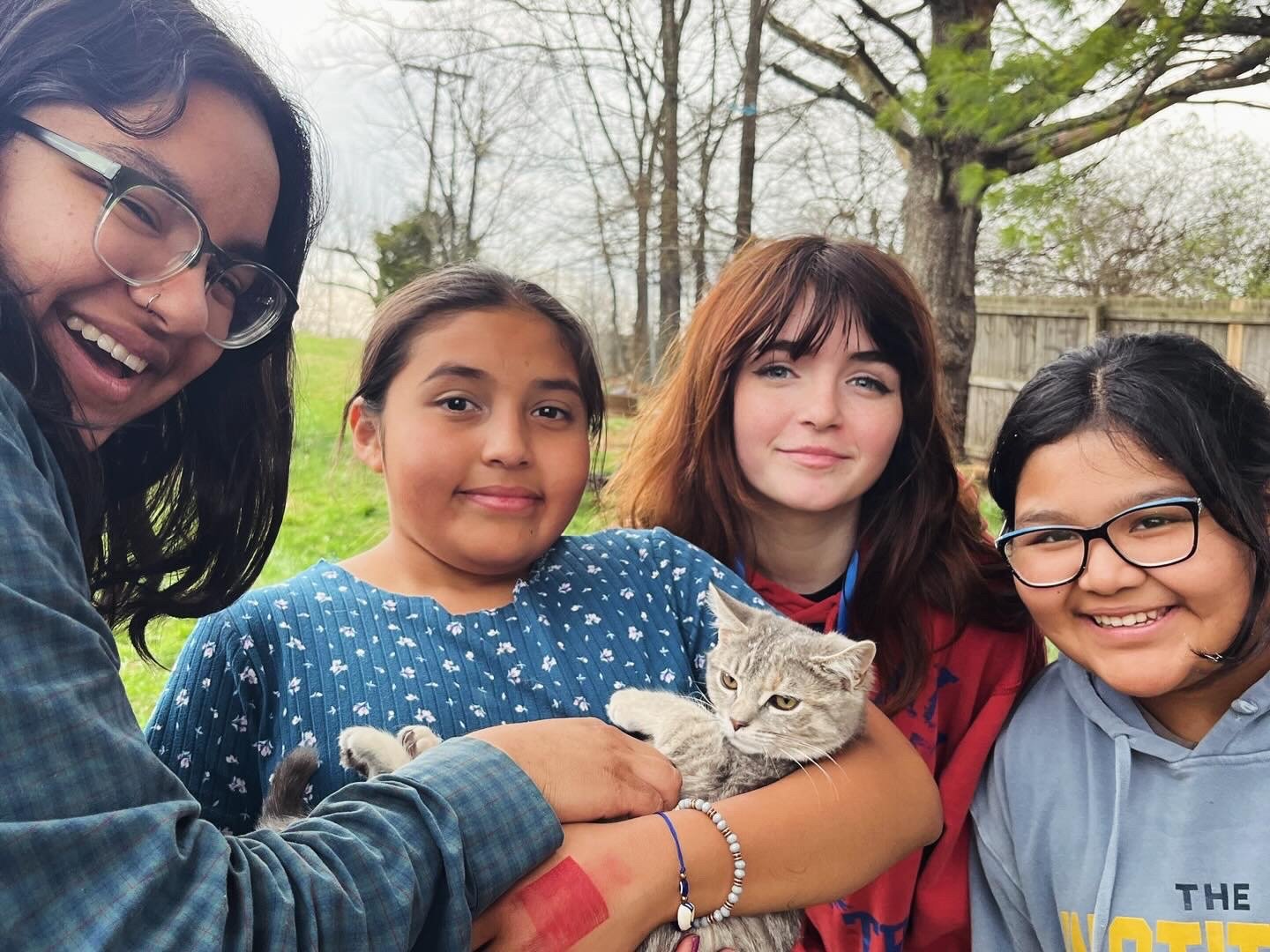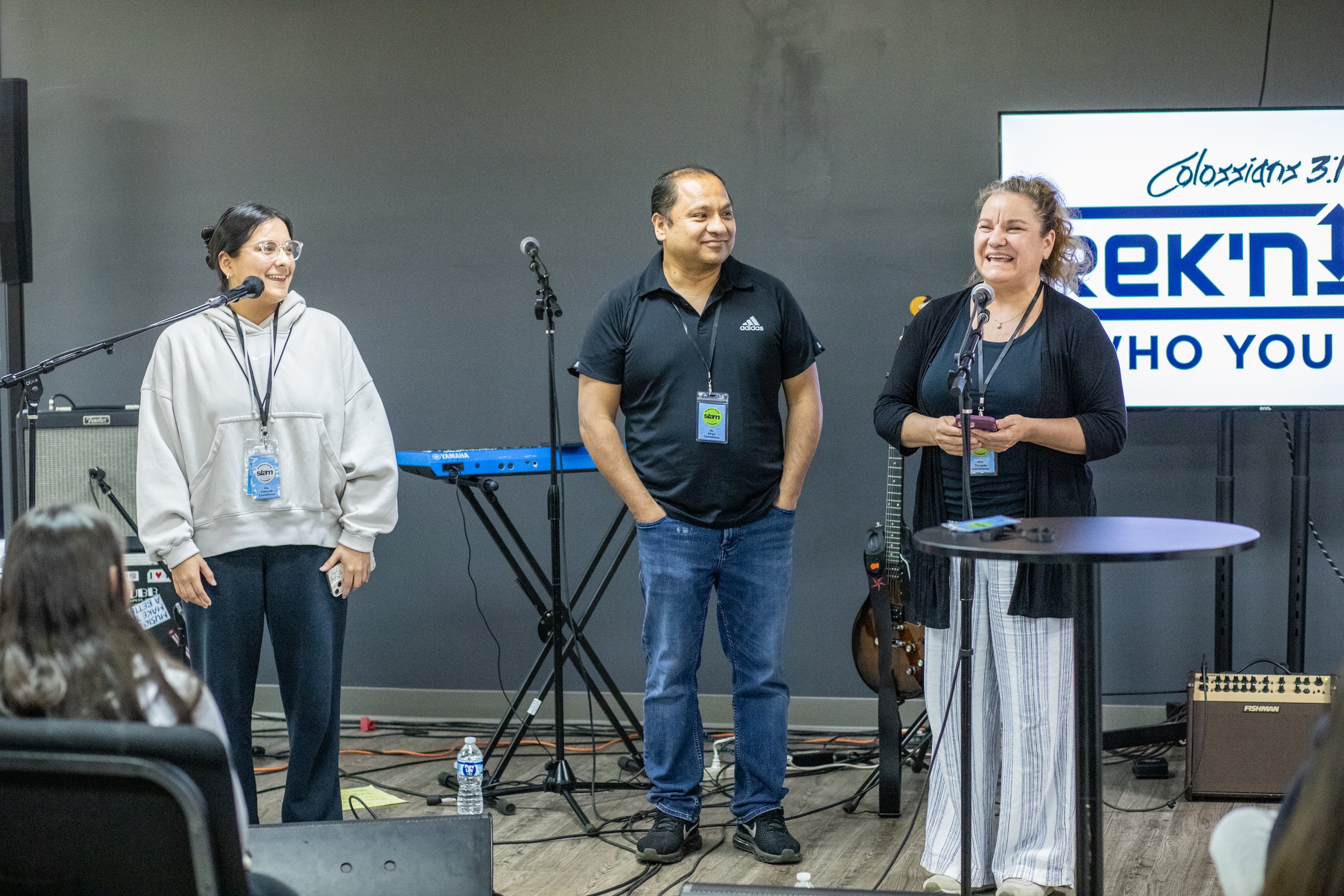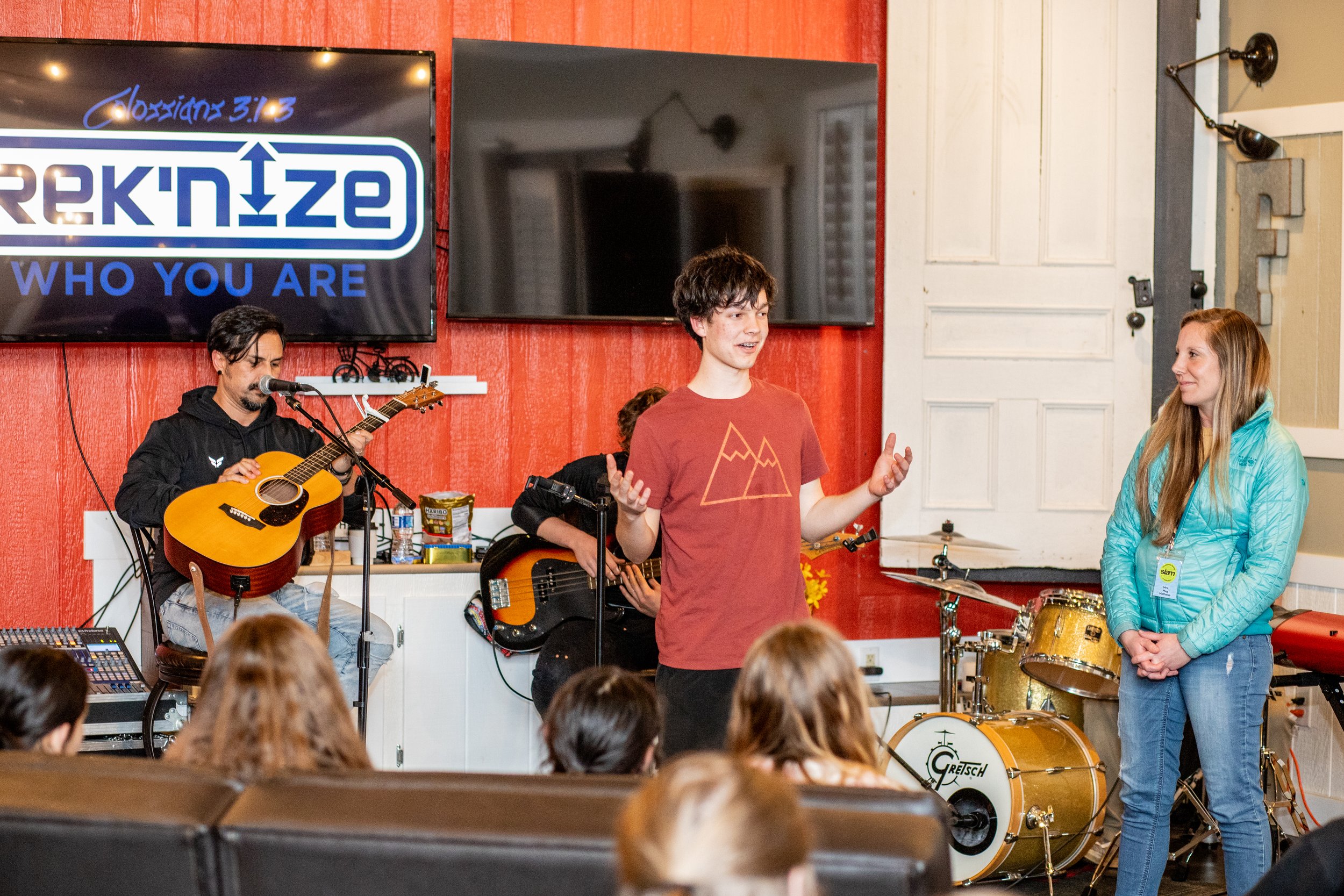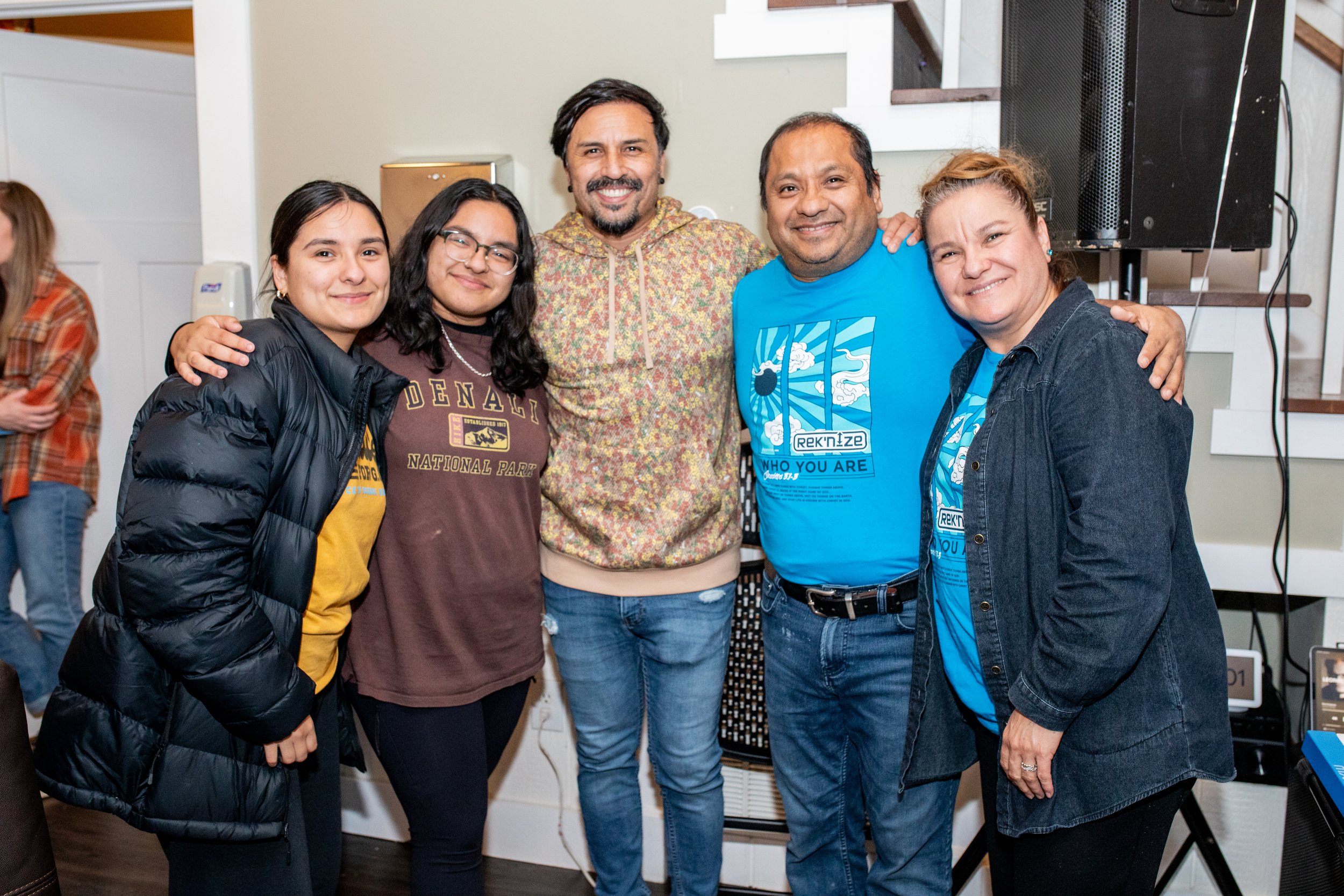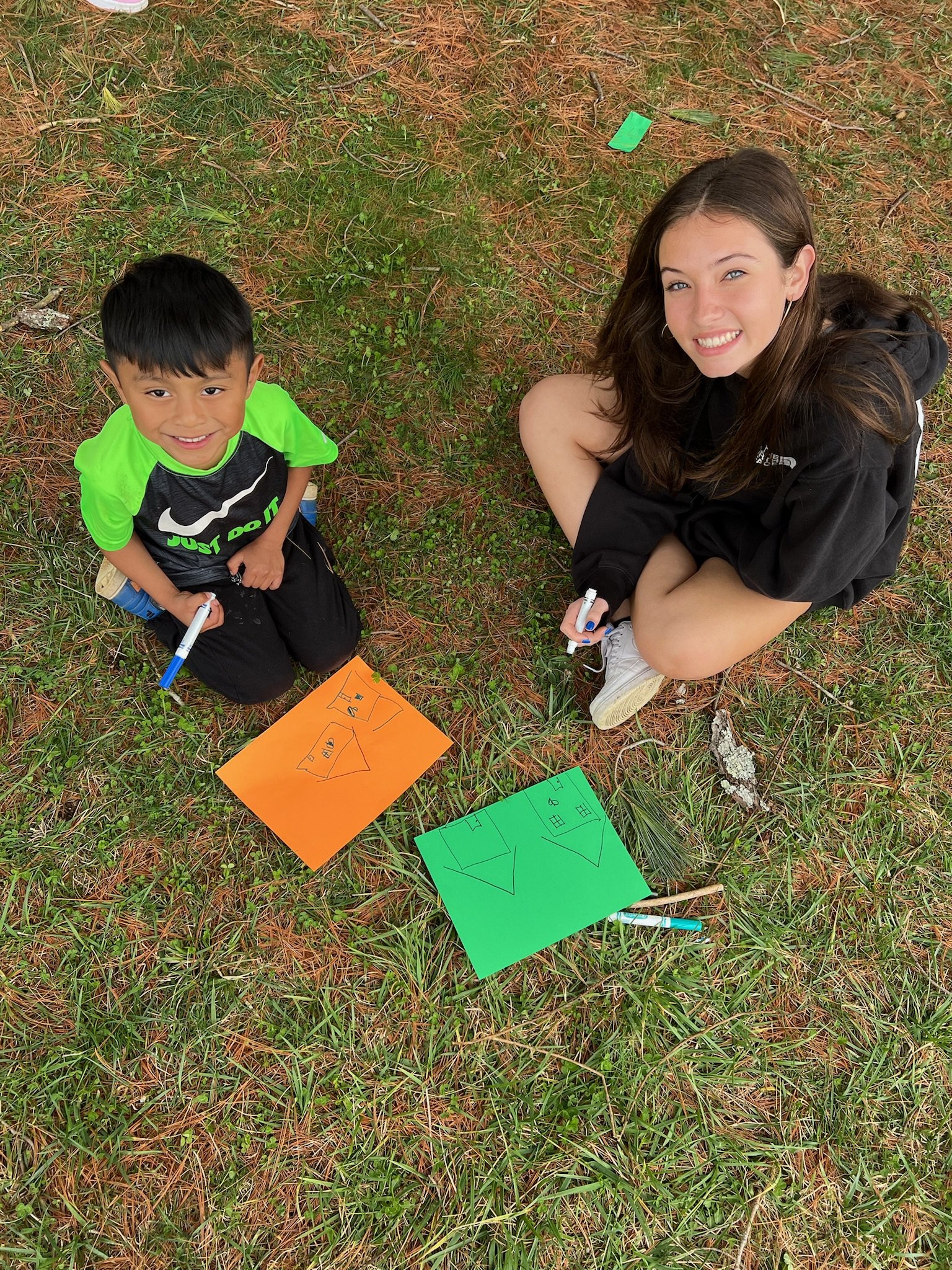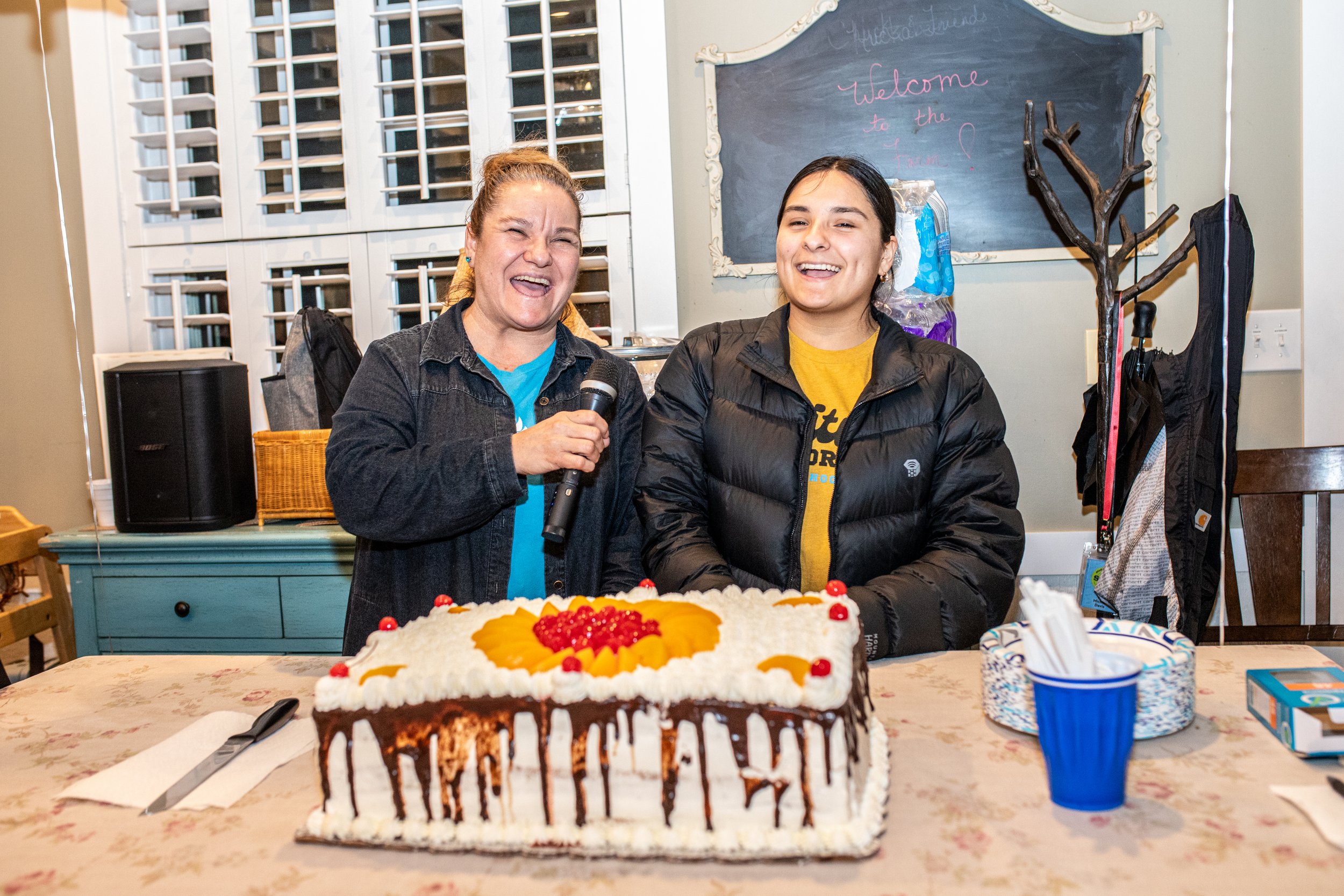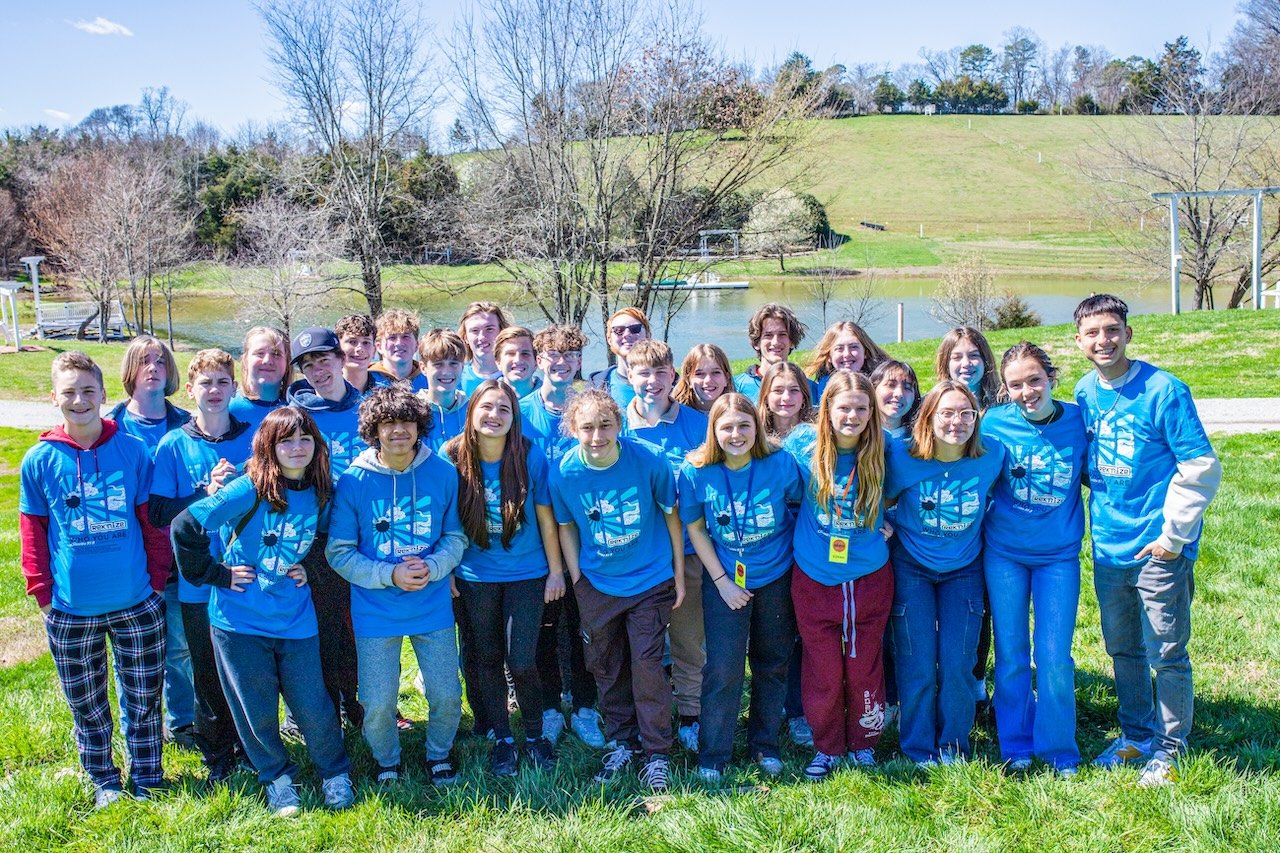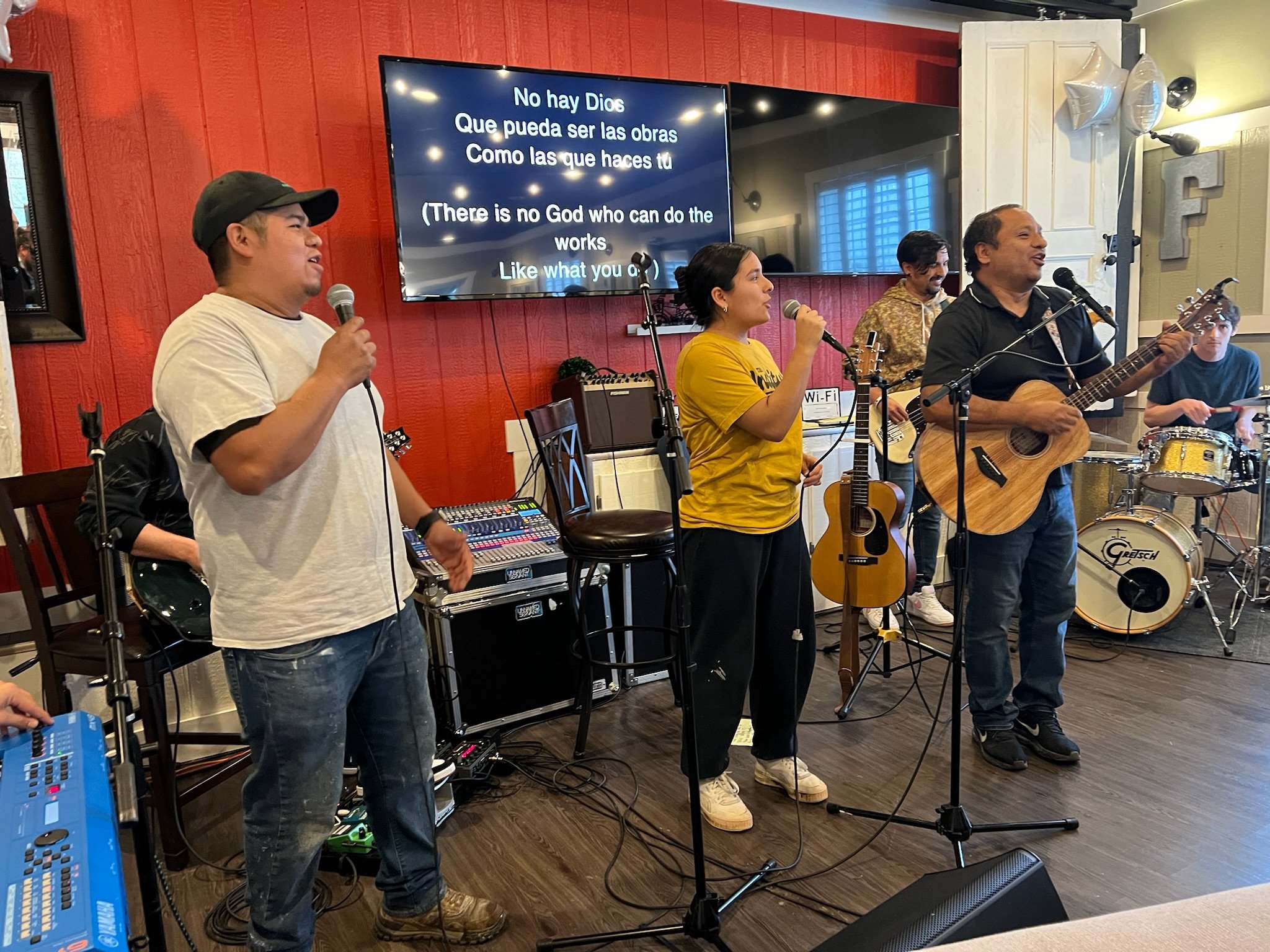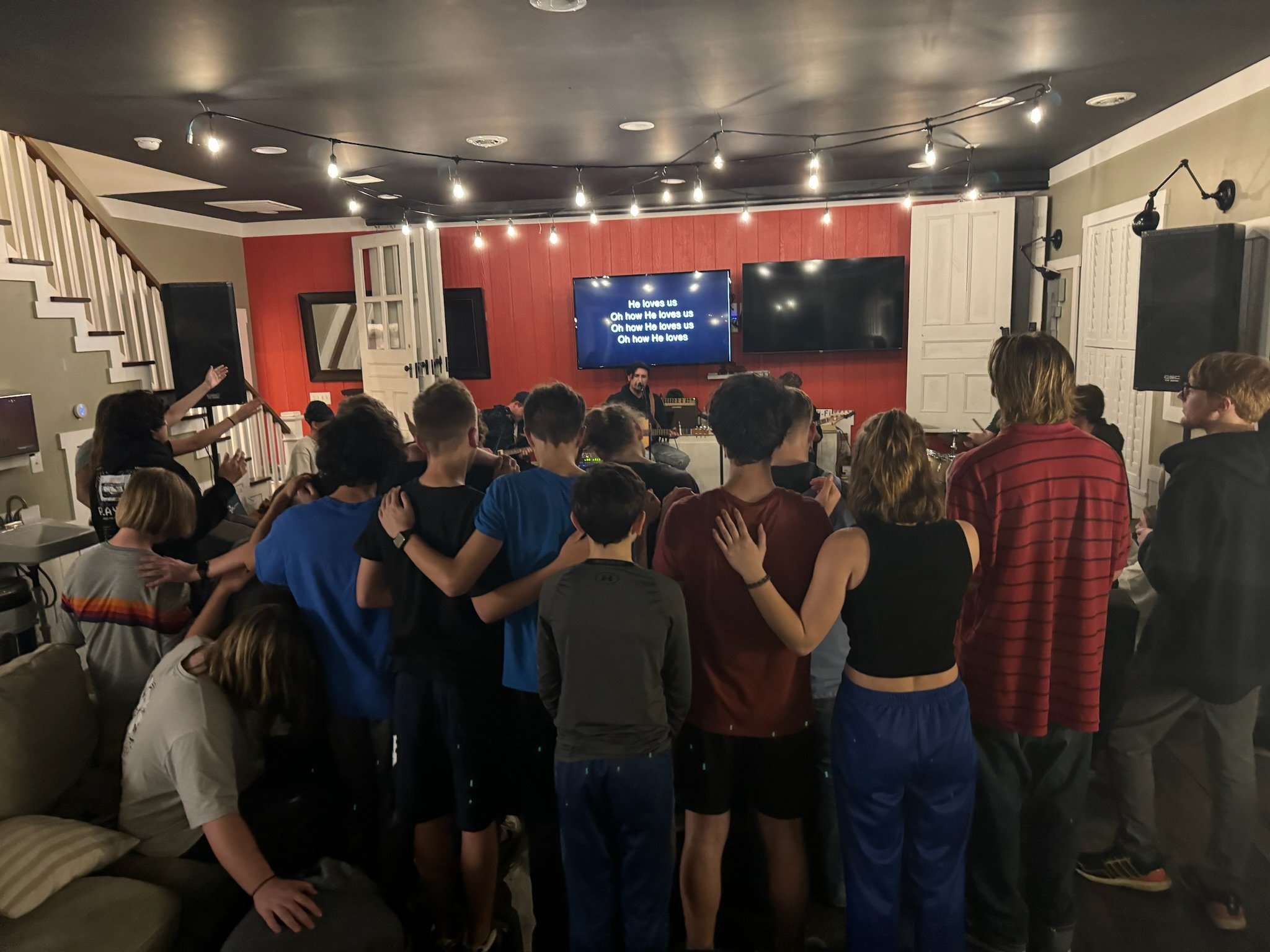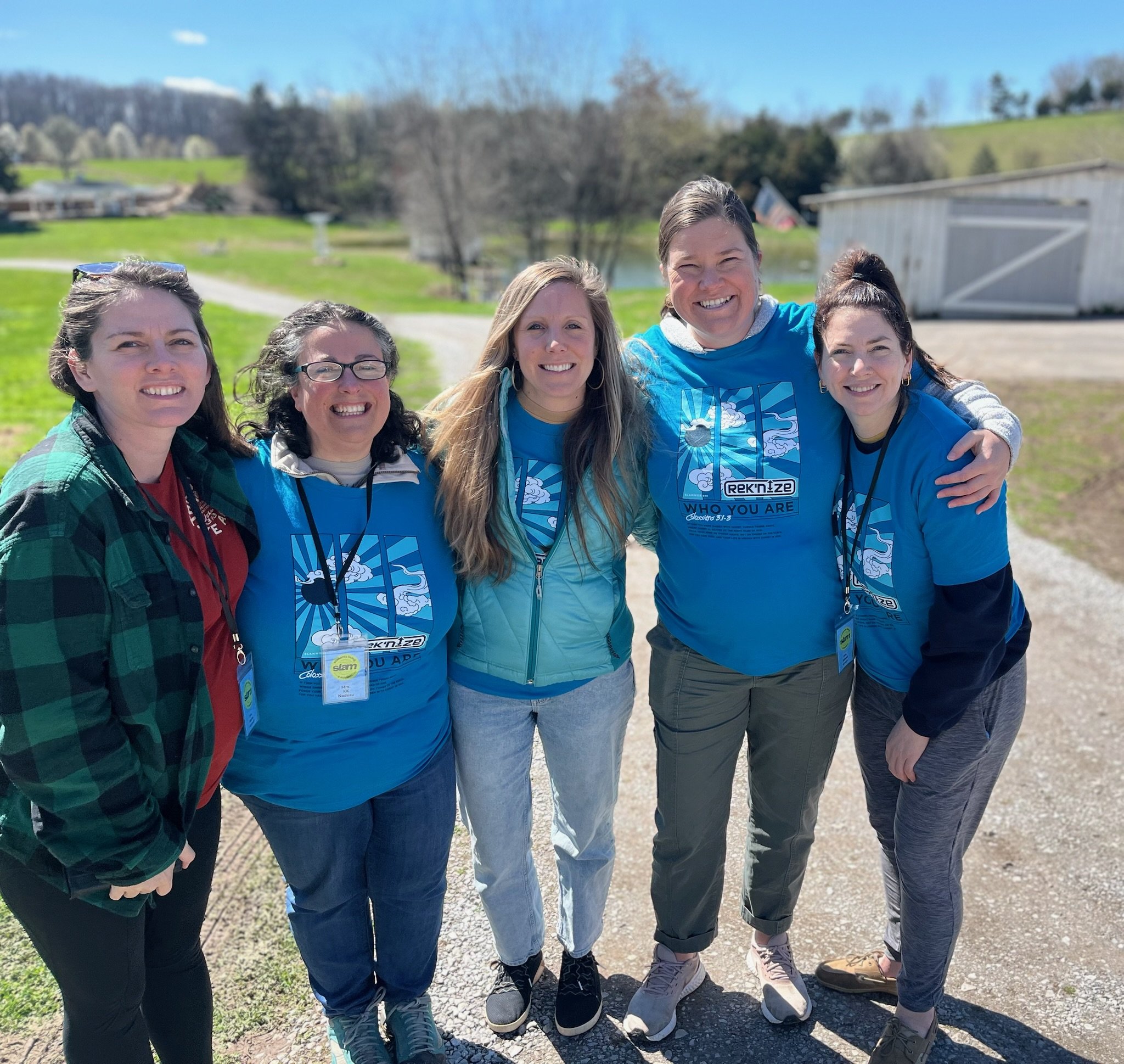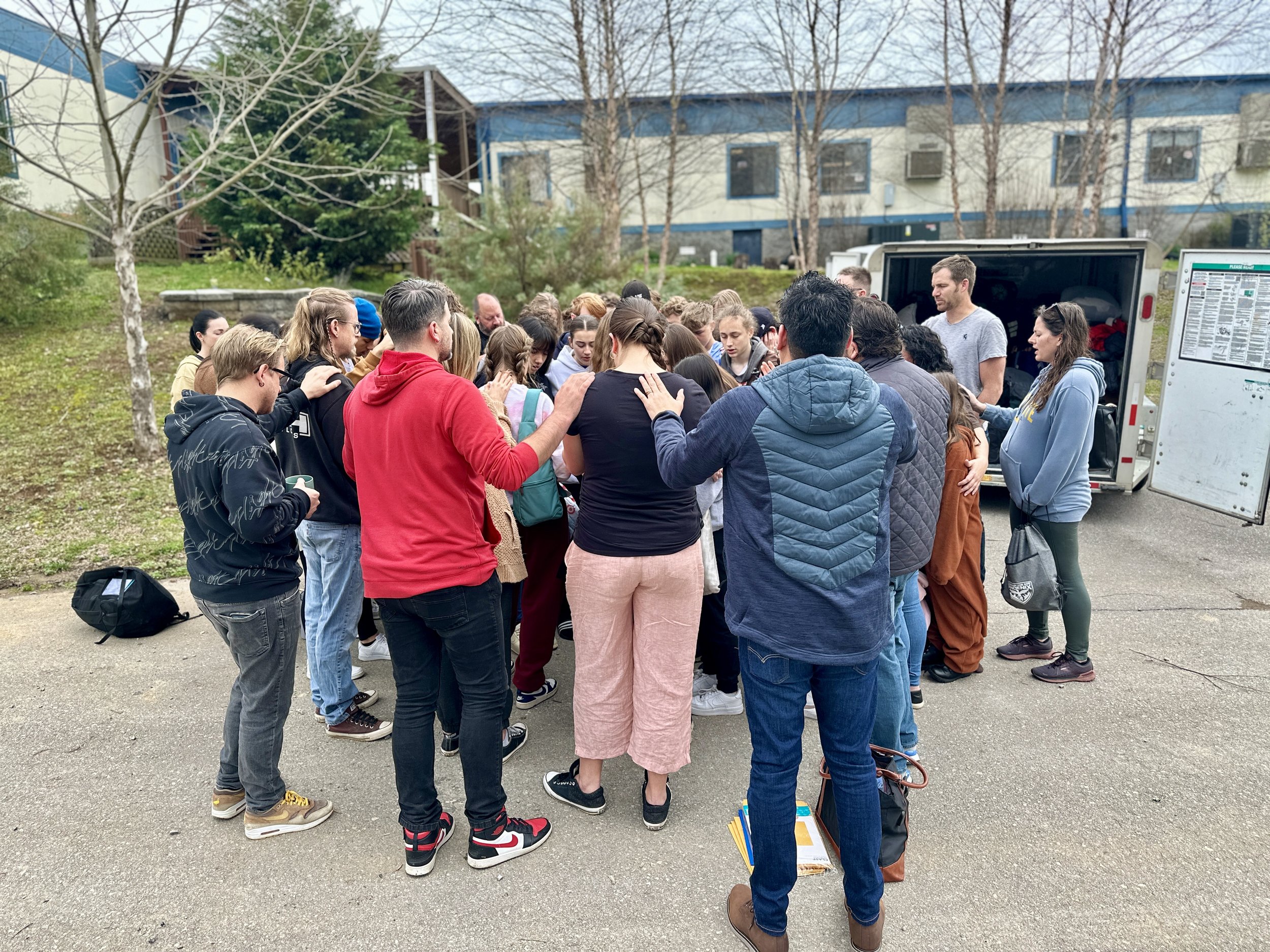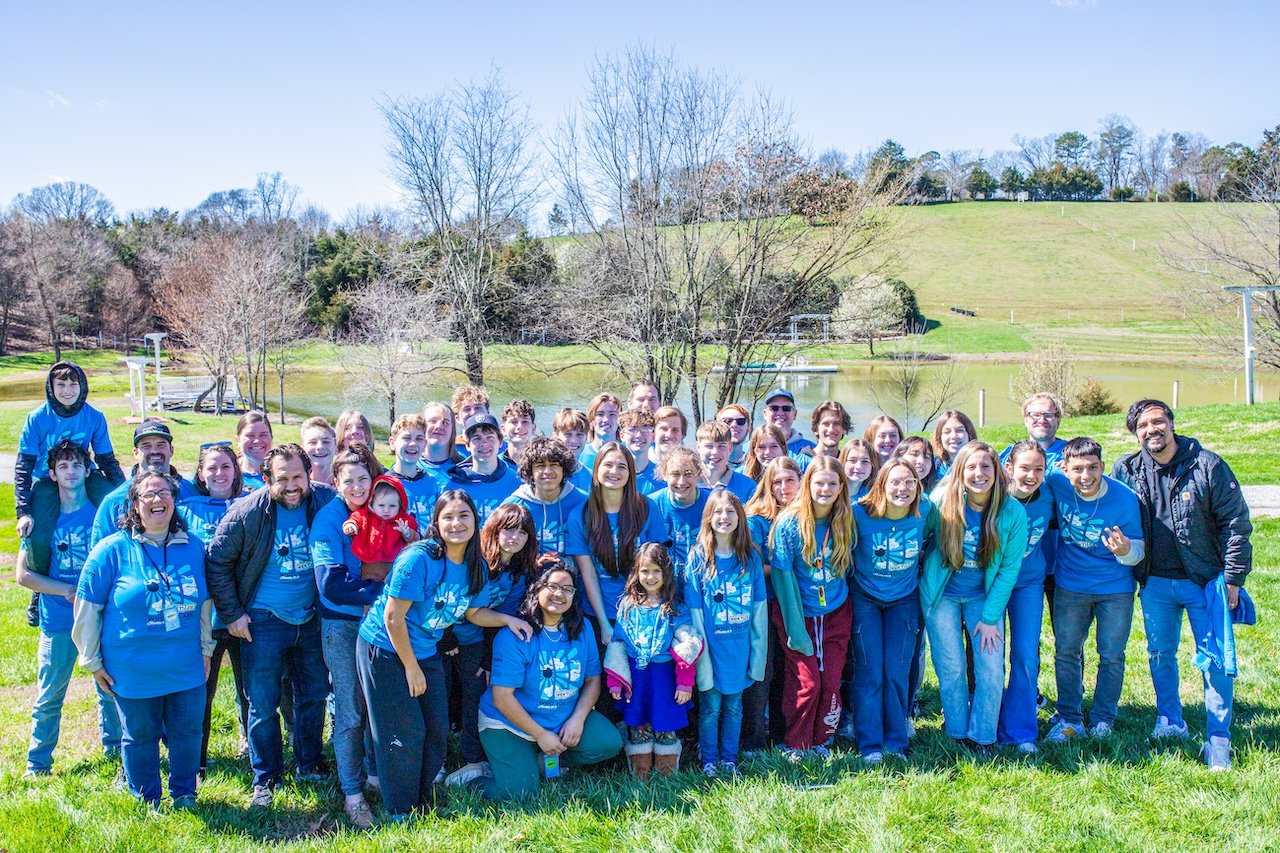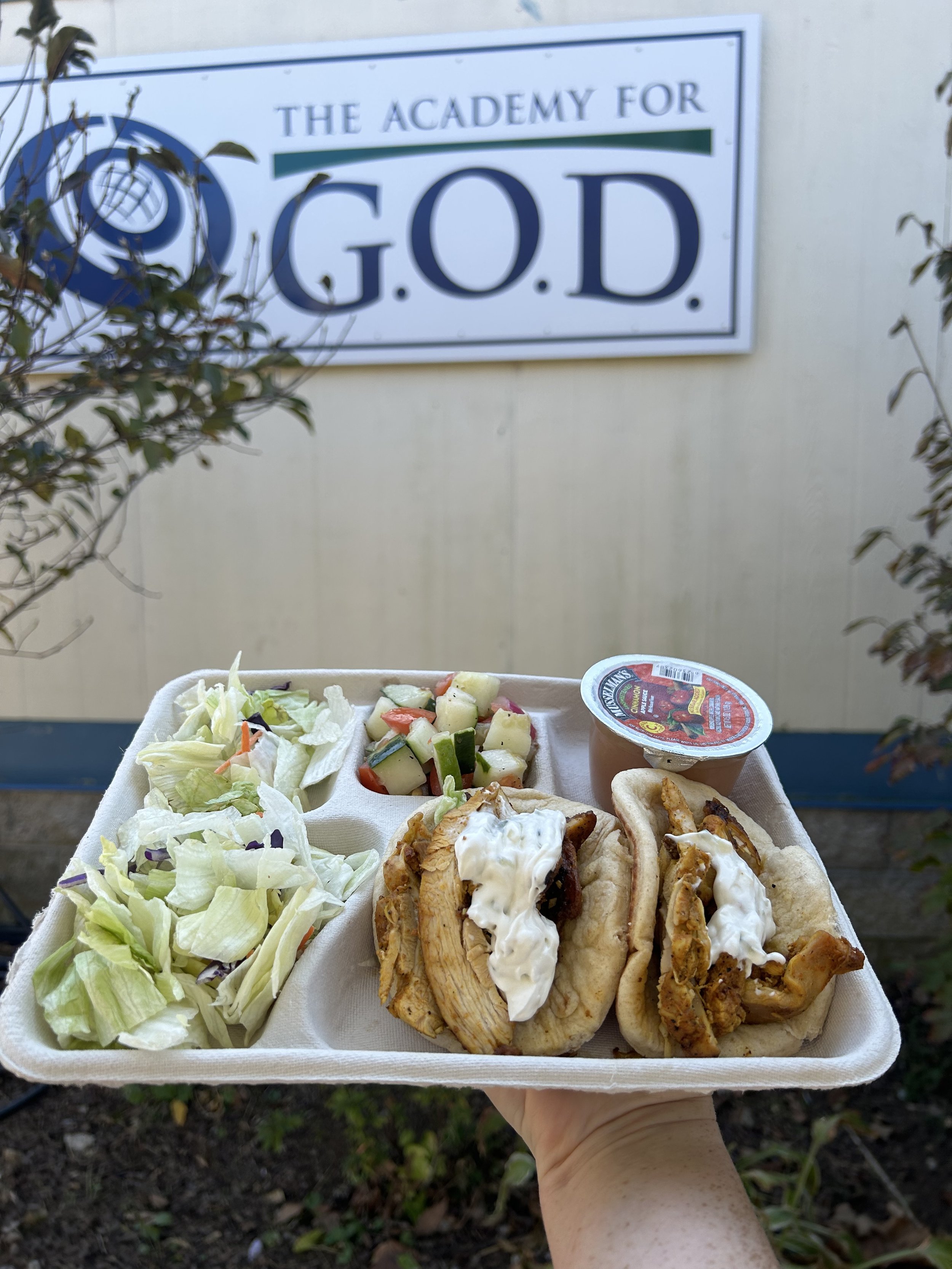On Set in Africa
This semester, our Academy Remote Learners in Uganda have come together for a film project. Together they are producing a mini-documentary: “Going to School in Nashville from Uganda.”
Victor Lubega sits for an interview, reflecting on the insecurities he felt regarding his English language skills when he first began joining Academy classes. He recently went back to look at his homework from 2 years ago, and marveled at how his English has improved since then!
“Rolling in 3-2-1... Action!” This semester, our Academy Remote Learners in Uganda have come together for a film project. Together they are producing a mini-documentary: “Going to School in Nashville from Uganda.” They report that this is the most fun they’ve ever had working on a group project! Each of the six Jr. High and High school students have a role. 9th grader Victor Lubega is serving as Director, and he shared the valuable lessons he is learning on leadership and humility. “It was a challenge to me as director to listen to everyone and then come up with an idea for everyone that I thought was good. But then if it turned out it wasn’t good, they needed to correct me and we had to make changes.”
He has also learned valuable skills on planning for and running an efficient meeting, with an agenda and a clear start and end time. Adding this project onto his course load has taught him how to use his time more efficiently in all areas. “Whereas before maybe I would take my time on all homework assignments, now I set a timer and focus and I work quickly to complete my assignments. Then I can move on to work on the documentary.”
The 15 minute film will show the daily life of these students, from their daily chores caring for the chickens and pigs, to how they Zoom into Academy classes in Nashville every evening. They share the joys and the challenges, and reflect on how they have grown as people through the last several years of being Academy students. Academy Home Education Vice Principal Rebekah Hjälmeby has been guiding them through the process. “I’m not a film expert, but I understand project management and the value of team dynamic. I always remind the students that while I’m super excited about the movie they will produce, they themselves are the real project here.
Ms. Hjälmeby meets weekly with the students over Zoom, and brings in technical experts to advise as needed. Here she is joined by Ms. Sara Davis, who graduated from film school and worked in the film industry in L.A.
They are God’s workmanship, and the practical and social skills they’re learning through this will serve them well in whatever area they are called to work.” The students admit that they have surprised even themselves with what they have been able to accomplish together. “Volleyball has been the main group activity we have done together, but this is teaching us how to be part of a team in a whole new way,” says Favour Kimbugwe. “Yes,” agrees Genesis Ssemakula, “At first I didn’t really expect us to be able to do much. I was mostly motivated by the enthusiasm of my teachers, because they were really excited, and I didn’t want to disappoint them. But once we finished the intro video, I could see for myself the potential of the project. I could see the pieces of the puzzle coming together even more beautifully than we had imagined.”
Genevieve, an 8th grader who is one of two Videographers on the project, has learned much about operating a camera through the experience. Additionally, she has learned to critically think about the audience’s perspective. “As a videographer, you have to use your wisdom and brain to think how to catch the audience’s attention. And make them feel different emotions throughout different scenes.” Sserwada Gideon shared a similar reflection. “I am learning to create a background sound related to the emotions displayed by someone on screen.” Gideon is a talented musician, and he is writing the score and managing audio for the project. He too is learning to think about how to tell a story in a captivating way, and use music to help the audience connect emotionally.
Script writer Rebecca Lubega has the challenging task of creating a narrative that pulls together all of the interviews, B-roll and story angles. She is loving the challenge of learning this new genre of writing. The students have a deadline of the end of May to complete this project. Stay tuned to see the finished project, and join us in praying for and celebrating the work that God is doing in each of these projects of His!
"Who Are Our Role Models Today?"
Senior student, Kiah Roufs reflects on historical biographies course where she studied Richard Wurmbrand as a hero of faith.
Written by senior student, Kiah Roufs
At the Academy, students are encouraged to learn about people of faith throughout history in order to have role models in their own walk with the Lord. Young people have so many voices coming at them through culture, social media, and celebrities. Our prayer is that they give their attention to God’s word and find encouragement from those who have lived lives of faith.
In our fast-paced world, the craving of genuine role models remains crucial for young people. Where are our role models today? Learning about the life of Richard Wurmbrand sheds light on authentic and holy leadership. Wurmbrand endured persecution, yet with relentless faith he showed his resilience and courage. His faith amidst adversity serves as the type of role model we desperately need in our society. Even though modern ideas can be popular and tempting to follow, we shouldn't forget about the important values that God’s word teaches and historical figures like Wurmbrand represent. I think it’s valuable that we pay more attention to people like Wurmbrand and the lasting impact they’ve made on history. His story teaches us valuable lessons and though it may be separated from our current situations, there are still the values and characteristics that he stood for that can help us today.
Wurmbrand didn't walk away with his experiences with just a story. He instead used his experiences to be an advocate and serve others. This is the main thing that makes him a hero of faith to me: he's putting his experiences and lessons learned into practice. He was a laborer for the production of God's kingdom. In 1967 he started an organization called, "Voice of the Martyrs". Through this, he was able to become an even bigger advocate for people suffering from religious persecution. He provided support practically for people in need. For me, this is a sign of God at work.
On a summer mission trip with the Academy for GOD to El Salvador, Kiah facilitates a children’s program for a local neighborhood. Participating in cross-cultural ministry is an impactful experience we hope to give all Academy students as a way to connect with others who may lack access or opportunity.
"Faith is pragmatic." This is something that Mr. Garner taught us in class and that has stuck with me in observing heroes of the faith. Faith has to be put into action to mean something. Wurmbrand displayed incredible faith during his years in prison, but until he chose to do something with it, it couldn’t make a lasting impact on others. He stood up for those in need and wasn't quiet about it. Fruit came from his actions, he was able to raise awareness for what he went through and others who went through similar things. He contributed to the development and the building of people who are God's ultimate possessions. These are the type of role models who set holy examples of how to be. So I challenge you to consider: who are your role models? How are they encouraging you to be a child of God and bring change and hope into this world?
Home Education Exemplary Students
Throughout the school year we acknowledge exemplary students within our Home Education program. So far this year, the Exemplar award has been given to two hard-working students, 11th grader Rebecca Lubega (Uganda) and 7th grader Esme García (Morristown, TN). These young ladies are both full-time remote learners, attending classes virtually through our hybrid classroom setups.
In the Fall 2023 semester, Rebecca Lubega stood out to her teachers for taking ownership of her education with responsibility and enthusiasm. She had outstanding attendance in her classes and engaged course content with questions. Rebecca contacted her teachers regularly to stay on top of class work. As a Junior she did an outstanding job on her Directed Studies project, exploring the relationship between culture and food and how history has shaped those connections. This project culminated in a meal she prepared and hosted for her church community, organizing volunteers, and sharing with her guests about the things she learned throughout the process. Rebecca has shown great determination to succeed and we are so proud to acknowledge her accomplishments.
Esme is in her first year with The Academy, and she has demonstrated resilience and faith in adjusting to a completely online school program. This spring in particular, her teachers have noted Esme’s consistent contributions in class, and her diligence to submit timely work. She has shown humility and positivity, persevering in her classes and making new friendships. Esme has truly had to practice faith in the Lord, and trust in her parents and teachers in this season, and we are happy to celebrate her!
A Transformative Spring Break on Mission in Morristown, TN
The Academy’s spring mission trip to Morristown was more than just a week of service; it was a transformative time of spiritual growth. Through intentional acts of kindness and service, students discovered the true meaning of discipleship and the love of God. As they carry the lessons and memories of their trip forward, they are empowered to live out their faith boldly and compassionately, making a tangible difference in the world around them and embodying the spirit of love and service that defines the kingdom of God.
Wow, what an incredible way to kick off Spring Break! Last week a team of about 50 Academy high schoolers and leaders set off from our campus in Nashville, to spend four days serving in Morristown TN. There, we partnered with our sister church, La Iglesia Comunidad de Dios, to minister to communities of need in that city.
Going into the trip, Headmaster Garner exhorted the high schoolers to make each moment count. Referencing Psalms 90:12, he encouraged students to be aware of each task at hand, from worship to fellowship to service, and engage it fully. “Four days can seem short, but if you are present and intentional in every moment, the Lord can multiply the impact of those days.”
The trip began with intentional conversations during the car ride. Students were given prompts to engage in discussions about their spiritual giftings. Taking time to identify each other’s strengths and speak words of encouragement, they also shared personal hopes with each other. These conversations laid the foundation for a sense of unity and purpose within the group as they began the mission trip.
A stop at Buc-ees Travel Center provided a practical lesson in selflessness and working with limited means. Given a small budget, students were tasked with organizing themselves into groups, and selecting snacks to share that fit within their limited means. They had to consider dietary needs and preferences within their group, along with nutritional value of the snacks they chose, to best nourish them for the afternoon ahead. This exercise served to reinforce collaboration and stewardship, but also as a contrast to the very common mindset of “splurge on snacks while we travel.”
Upon arriving in Morristown, students wasted no time immersing themselves in meaningful service projects on our first day! From repairing homes and landscaping to leading worship sessions and organizing Vacation Bible School programs, they tackled each task with energy, with hearts prepared for giving. That evening, Pastor Efrain (our host and lead pastor of the Community Church for GOD) shared a precious testimony of how on the other side of years of faithful service, he now gets to see his children follow in similar pursuit of our Lord. With tears in his eyes he communicated how truly grateful to see his college-aged daughters participate in ministry. This vulnerability softened the team’s eyes to see and understand the importance of not only service, but of hearing stories of God's faithfulness through obedience.
One of the most memorable moments of the trip occurred when our Academy students were welcomed into host homes within the Hispanic church community. They got to experience firsthand the power of generosity through the hospitality of their hosts. Some hosts gave up their master bedroom to accommodate the students. Others stayed up late sharing stories of ministry. Still others got up early to prepare hand-made tortillas for a delicious breakfast. These encounters left a lasting impression, prompting reflections on the biblical principle of hospitality and the obligation to care for one another as members of God's family.
Jesus said that he did not come to be served, but to serve. Through times of service, our students' hearts were impacted and softened to the move of God. In each project they encountered individuals whose stories and struggles deeply touched their hearts. From adults with disabilities to children living in poverty, each interaction served as a reminder of the inherent dignity and value of every individual made in God’s image. The teens later shared how these encounters sparked a desire to advocate for the marginalized, and to be instruments of God's love and compassion in a world often marked by injustice and inequality. Vice Principal, Ms. Mathews, testified, “I served with the upperclassmen at Hope and Thrive Academy, and we were immediately met with the Lord’s spirit as we entered the room with 20 adults with disabilities ready to sing and praise the Lord. The students led worship. Watching these adults use sign language while singing, “Jesus loves me, this I know, for the Bible tells me so,” brought tears to my eyes. God was truly in our midst and the students were impacted in ways I did not anticipate. I was impacted in ways I did not anticipate!”
As the days unfolded, students found themselves confronted with the realities of poverty, disability, and systemic injustice. Yet, amidst the challenges, they also discovered moments of joy, resilience, and hope. Whether leading worship for adults with disabilities or hosting Vacation Bible School for children living in poverty, students embraced each opportunity to serve with humility and compassion, embodying the spirit of Christ in their actions and attitudes. We were so proud to see our students giving of themselves fully! They stepped out of personal comfort zones to engage with people, practice their Spanish, and even serve in the midst of rainy weather. On Friday afternoon our students hosted a Vacation Bible School at a low-income housing complex in Morristown. When they pulled into the run-down area, driving through huge potholes, they were greeted by 35 laughing children waiting for them in the field, already anticipating their program. The students made the Lord proud through their planning and selfless giving, making children smile, play and feel seen by our Lord.
In our evening times of worship and Bible teaching, Headmaster Garner spoke on our theme, “Rek’nize” from Colossians 3:1-3, sharing how Jesus raises us up into a strong identity by identifying with him. In a world with so much confusion and insecurity about identity, Jesus invites us near, to learn about who we are from the One who made us. The prayers of the righteous are effective because at the end of only the second night, students were already giving testimonies of how the Lord was giving them sight for their future and what it all holds. The culmination of the trip was marked by moments of spiritual growth and reflection. Engaging in worship and fellowship with the local church community, students experienced a renewed sense of purpose and calling. They heard testimonies of personal transformation and reconciliation, which underscored the power of faith and community. It was inspiring to all who were present, to embrace their identities as children of God and agents of His grace and mercy in the world.
We concluded our Morristown mission trip by cooking and eating a wonderful breakfast alongside the La Iglesia church members. This was a sweet experience to witness as our students got immersed cross culturally both in language and fellowship. Students then were given time to journal and go on a prayer walk on the property before we had our final morning session. As the students returned from their walk, we began our testimonies from our time together, and more and more strongholds were breaking. God is truly helping these students move their sight from an earthly perspective to a heavenly one. The harvest is plentiful, but the laborers are few, and our students are able to see those in need, and are ready to answer the call within the spiritual giftings that God has given them.
In retrospect, the mission trip to Morristown was more than just a week of service; it was a transformative time of spiritual growth. Through intentional acts of kindness and service, students discovered the true meaning of discipleship and the love of God. As they carry the lessons and memories of their trip forward, they are empowered to live out their faith boldly and compassionately, making a tangible difference in the world around them and embodying the spirit of love and service that defines the kingdom of God.
The Nutritional Benefits of School Meals
March is national nutrition month, which is a perfect time to review the nutritional benefits of school meals. Dietary diversity and nutritional guidelines are two ways school meals can benefit a school age child’s nutrition.
1. Dietary Diversity: Dietary diversity is the variety of foods or food groups in a person's or household’s diet.1. Eating a variety of food and food groups is a key component to dietary diversity, which in turn allows for a greater amount of nutrients, vitamins and minerals to be consumed. “Low dietary diversity in children is linked to nutrient deficiencies that lead to a range of health conditions such as anemia and stunted growth” 2,3. School meals present a unique ability to address a potential lack of dietary diversity and ensure students have access to a variety of meals. In a single week students have access to what are called ‘sub groups’ of vegetables. Per regulatory guiltiness students must have each of the following sub groups of veggies: leafy greens, dark greens, legumes, red/orange and a miscellaneous group that includes items like cucumbers. This means by default school meals will present students with the opportunity to take in a wide range of nutrients from just vegetables alone. This doesn’t include offerings of whole grains, proteins, milk and fruit. School meals are prepared meals, meaning they are cooked for the students daily. Because of this dietary diversity increases just for the fact we are not limited to just grab and go foods or cold foods such as sandwiches or prepackaged items. Students have on the menu several types of whole grains throughout the week as well as a wide range of fruits, all of which present their unique nutrient dense qualities.
2. Nutritional Guidelines: The second way that school meals present a huge nutritional benefit is through the USDA nutritional guidelines for meals. As a school we have to ensure students receive items that have the appropriate amount of calories, fat, sodium and in some cases sugar. Students receive meals that have been tailored for their age/grade. The meals also have to have all the appropriate components including, grains, meat, vegetables, milk and fruit. Students will undoubtedly have a more nutritionally balanced when the meal has been planned out and calculated down to the calorie.
School meals are a fantastic way to ensure your student receives 5 meals a week that are pre-planned, diverse and meet strict nutritional guidelines.
1. Mason, P. & Lang, T. Sustainable diets: how ecological nutrition can transform consumption and the food system. (Routledge, 2017).
2. De Benoist, B., Cogswell, M., Egli, I. & McLean, E. Worldwide prevalence of anaemia 1993-2005; WHO Global Database of anaemia. (2008).
3. Rah, J. H. et al. Low dietary diversity is a predictor of child stunting in rural Bangladesh. European journal of clinical nutrition 64, 1393 (2010).














